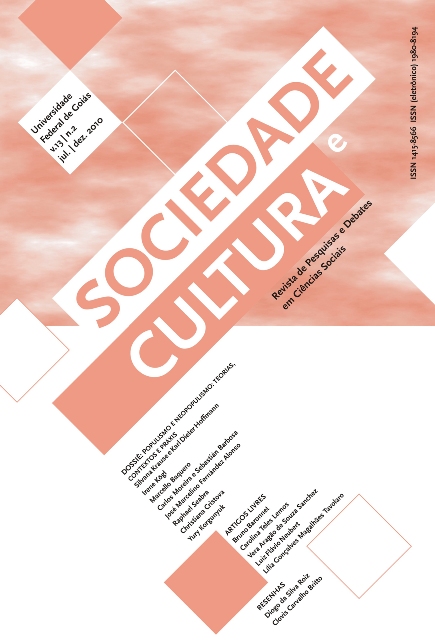Entre o popular e o erudito, "a civilização no Brasil começou pelos pés"
DOI:
https://doi.org/10.5216/sec.v13i2.13430Palavras-chave:
Ballet, carnaval, danças folclóricas, cultura, tradição inventadaResumo
O senso comum considera o ballet uma arte importada, sem nada a ver com a nossa tradição cultural, enquanto o carnaval seria a nossa manifestação popular mais significativa. Com base nessa crença, este trabalho pretende mostrar que esses dois gêneros culturais, assim como algumas danças folclóricas brasileiras, partilham da mesma origem. Observamos como as composições coreográficas dos ballets podem apresentar elementos ditos populares, assim como, no carnaval, a sistematização coreográfica é cada vez mais praticada nas escolas de samba, campo no qual profissionais oriundos das artes chamadas de eruditas imprimem princípios acadêmicos à arte popular. Assim, tomamos como ponto de partida o conceito da “tradição inventada”, proposto por Eric Hobsbawm e Terence Ranger, para investigar de que forma ocorrem as (re)apropriações entre essas três expressões artísticas e como se dá a convivência entre a dança erudita e a dança popular nos dias de hoje.Downloads
Não há dados estatísticos.
Downloads
Publicado
2011-03-02
Como Citar
SANCHEZ, Vera Aragão de Souza. Entre o popular e o erudito, "a civilização no Brasil começou pelos pés". Sociedade e Cultura, Goiânia, v. 13, n. 2, p. 269–276, 2011. DOI: 10.5216/sec.v13i2.13430. Disponível em: https://revistas.ufg.br/fcs/article/view/13430. Acesso em: 11 fev. 2026.
Edição
Seção
Artigos Livres
Licença
Autores/as que publicam nesta revista concordam com os seguintes termos:
- Autores/as mantêm os direitos autorais e concedem à revista o direito de primeira publicação, sendo o trabalho simultaneamente licenciado sob a Creative Commons Attribution License, o que permite o compartilhamento do trabalho com reconhecimento de autoria e da publicação inicial nesta revista.
- Autores/as têm autorização para assumir contratos adicionais separadamente, para distribuição não exclusiva da versão do trabalho publicada nesta revista (ex.: publicar em repositório institucional ou como capítulo de livro), com reconhecimento de autoria e da publicação inicial nesta revista.
- Autores/as têm permissão e são estimulados/as a publicar e a distribuir seu trabalho online (ex.: em repositórios institucionais ou na sua página pessoal) a qualquer ponto antes ou durante o processo editorial, já que isso pode gerar alterações produtivas, bem como aumentar o impacto e a citação do trabalho publicado (veja O Efeito do Acesso Livre).


 Esta revista está licenciada sob a licença
Esta revista está licenciada sob a licença 
